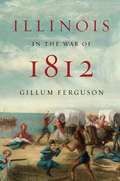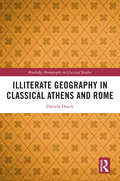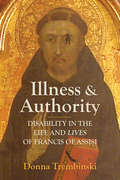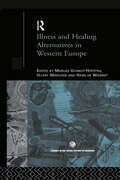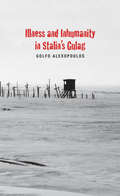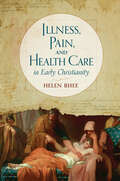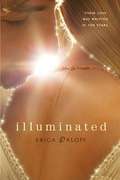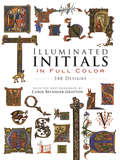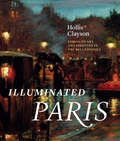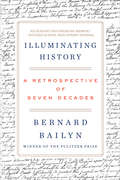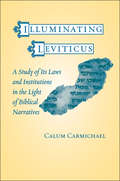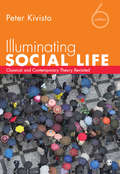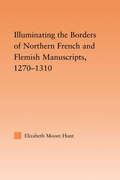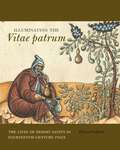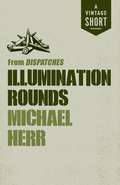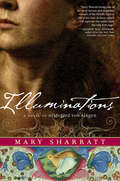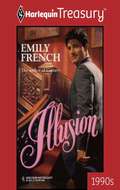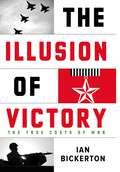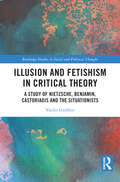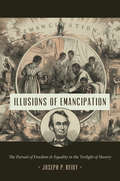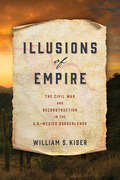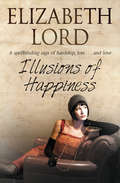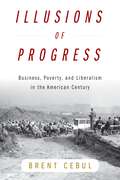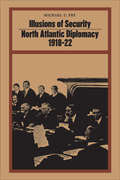- Table View
- List View
Illinois in the War of 1812
by Gillum FergusonRussell P. Strange "Book of the Year" Award from the Illinois State Historical Society, 2012. On the eve of the War of 1812, the Illinois Territory was a new land of bright promise. Split off from Indiana Territory in 1809, the new territory ran from the junction of the Ohio and Mississippi rivers north to the U.S. border with Canada, embracing the current states of Illinois, Wisconsin, and a part of Michigan. The extreme southern part of the region was rich in timber, but the dominant feature of the landscape was the vast tall grass prairie that stretched without major interruption from Lake Michigan for more than three hundred miles to the south. The territory was largely inhabited by Indians: Sauk, Potawatomi, Kickapoo, and others. By 1812, however, pioneer farmers had gathered in the wooded fringes around prime agricultural land, looking out over the prairies with longing and trepidation. Six years later, a populous Illinois was confident enough to seek and receive admission as a state in the Union. What had intervened was the War of 1812, in which white settlers faced both Indians resistant to their encroachments and British forces poised to seize control of the upper Mississippi and Great Lakes. The war ultimately broke the power and morale of the Indian tribes and deprived them of the support of their ally, Great Britain. Sometimes led by skillful tacticians, at other times by blundering looters who got lost in the tall grass, the combatants showed each other little mercy. Until and even after the war was concluded by the Treaty of Ghent in 1814, there were massacres by both sides, laying the groundwork for later betrayal of friendly and hostile tribes alike and for ultimate expulsion of the Indians from the new state of Illinois. In this engrossing new history, published upon the war's bicentennial, Gillum Ferguson underlines the crucial importance of the War of 1812 in the development of Illinois as a state. The history of Illinois in the War of 1812 has never before been told with so much attention to the personalities who fought it, the events that defined it, and its lasting consequences. Endorsed by the Illinois Society of the War of 1812 and the Illinois War of 1812 Bicentennial Commission.
Illiterate Geography in Classical Athens and Rome (Routledge Monographs in Classical Studies)
by Daniela DueckThis study is devoted to the channels through which geographic knowledge circulated in classical societies outside of textual transmission. It explores understanding of geography among the non-elites, as opposed to scholarly and scientific geography solely in written form which was the province of a very small number of learned people. It deals with non-literary knowledge of geography, geography not derived from texts, as it was available to people, educated or not, who did not read geographic works. This main issue is composed of two central questions: how, if at all, was geographic data available outside of textual transmission and in contexts in which there was no need to write or read? And what could the public know of geography? In general, three groups of sources are relevant to this quest: oral communications preserved in writing; public non-textual performances; and visual artefacts and monuments. All these are examined as potential sources for the aural and visual geographic knowledge of Greco-Roman publics. This volume will be of interest to anyone working on geography in the ancient world and to those studying non-elite culture.
Illness and Authority: Disability in the Life and Lives of Francis of Assisi
by Donna TrembinskiIllness and Authority examines the lived experience and early stories about St. Francis of Assisi through the lens of disability studies. This new approach re-centres Francis’s illnesses and infirmities and highlights how they became barriers to wielding traditional modes of masculine authority within both the Franciscan Order he founded and the church hierarchy. So concerned were members of the Franciscan leadership that the future saint was compelled to seek out medical treatment and spent the last two years of his life in the nearly constant care of doctors. Unlike other studies of Francis’s ailments, Illness and Authority focuses on the impact of his illnesses on his autonomy and secular power, rather than his spiritual authority. From downplaying the comfort Francis received from music to disappearing doctors in the narratives of his life, early biographers worked to minimize the realities of his infirmities. When they could not do so, they turned the saint’s experiences into teachable moments that demonstrated his saintly and steadfast devotion and his trust in God. Illness and Authority explores the struggles that early authors of Francis’s vitae experienced as they tried to make sense of a saint whose life did not fit the traditional rhythms of a founder-saint.
Illness and Healing Alternatives in Western Europe (Routledge Studies in the Social History of Medicine)
by Hilary Marland Marijke Gijswijt-Hofstra Hans De WaardtDespite the recent upsurge in interest in alternative medicine and unorthodox healers, Illness and Healing Alternatives in Western Europe is the first book to focus closely on the relationship between belief, culture, and healing in the past. In essays on France, the Netherlands, Germany, Spain, and England, from the sixteenth century to the present day, the authors draw on a broad range of material, from studies of demonologists and reports of asylum doctors, to church archives and oral evidence.
Illness and Inhumanity in Stalin's Gulag
by Golfo AlexopoulosA new and chilling study of lethal human exploitation in the Soviet forced labor camps, one of the pillars of Stalinist terror In a shocking new study of life and death in Stalin’s Gulag, historian Golfo Alexopoulos suggests that Soviet forced labor camps were driven by brutal exploitation and often administered as death camps. The first study to examine the Gulag penal system through the lens of health, medicine, and human exploitation, this extraordinary work draws from previously inaccessible archives to offer a chilling new view of one of the pillars of Stalinist terror.
Illness, Pain, and Health Care in Early Christianity
by Helen RheeWhat did pain and illness mean to early Christians? And how did their approaches to health care compare to those of the ancient Greco-Roman world? In this wide-ranging interdisciplinary study, Helen Rhee examines the ways early Christians viewed illness, pain, and health care—and how they were influenced both by their own tradition and by the milieu of the larger ancient world. Throughout the book, Rhee places the history of medicine, Greco-Roman literature, and ancient philosophy in fruitful dialogue with early Christian literature and theology to show the nuanced ways Christians understood, appropriated, and reformulated Roman and Byzantine conceptions of health and wholeness from the second through the sixth centuries CE. Utilizing the contemporary field of medical anthropology, Rhee engages illness, pain, and health care as sociocultural matters. Through this and other methodologies, she explores the theological meanings attributed to illness and pain; the religious status of those suffering from these and other afflictions; and the methods, systems, and rituals that Christian individuals, churches, and monasteries devised to care for those who suffered. Rhee&’s findings ultimately provide an illuminating glimpse into an instrumental way that Christians began shaping a distinct identity—both as part of and apart from their Greco-Roman world.
Illuminated
by Erica OrloffSome loves are not made to last . . . Like Romeo and Juliet, Heloise and Abelard were doomed from the start, and their romance was destined to pass into history. Yet when sixteen-year-old Callie Martin discovers a diary hidden within an antique book, their story - and hers - takes on another life. For the diary leads Callie to the brilliant and handsome August, who is just as mysterious as the secret the diary hides. Their attraction is undeniable. As the two hunt down the truth behind the diary - and that of Heloise and Abelard's ancient romance - their romance becomes all-consuming. But Callie knows it can't last . . . love never does. Will their love that burns as bright as a shooting star flame out, or will these star-crossed lovers be able to defy history? .
Illuminated Initials in Full Color: 548 Designs (Dover Pictorial Archive)
by Carol Belanger GraftonAmong the glories of extant medieval manuscripts are the splendid illuminated initials in which geometric, curvilinear, animal, religious and other motifs intertwine to form extraordinarily beautiful and decorative letters.For this striking volume, Carol Belanger Grafton has selected 548 illuminated letters-alphabetically arranged-from 19th-century reprints of medieval manuscripts. Here are magnificently ornamented initials-some the length of an entire margin, another encompassing the page itself, others delicate miniatures. All are imaginatively and beautifully enhanced with royal and saintly figures, mythical creatures, knights in battle, exquisite florals and much more.Encompassing all the letters of the alphabet, and including a selection of hand-colored chromolithographs, this practical archive of lovely copyright-free designs not only provides commercial artists and illustrators with a wealth of usable letters, it offers a splendid sampling of the ancient art of manuscript illuminations.
Illuminated Paris: Essays on Art and Lighting in the Belle Époque
by Hollis ClaysonThe City of Light. For many, these four words instantly conjure late nineteenth-century Paris and the garish colors of Toulouse-Lautrec’s iconic posters. More recently, the Eiffel Tower’s nightly show of sparkling electric lights has come to exemplify our fantasies of Parisian nightlife. Though we reflect longingly on such scenes, in Illuminated Paris, Hollis Clayson shows that there’s more to these clichés than meets the eye. In this richly illustrated book, she traces the dramatic evolution of lighting in Paris and how artists responded to the shifting visual and cultural scenes that resulted from these technologies. While older gas lighting produced a haze of orange, new electric lighting was hardly an improvement: the glare of experimental arc lights—themselves dangerous—left figures looking pale and ghoulish. As Clayson shows, artists’ representations of these new colors and shapes reveal turn-of-the-century concerns about modernization as electric lighting came to represent the harsh glare of rapidly accelerating social change. At the same time, in part thanks to American artists visiting the city, these works of art also produced our enduring romantic view of Parisian glamour and its Belle Époque.
Illuminating History: A Retrospective Of Seven Decades
by Bernard BailynThe brilliance of a master historian shines through this personal account of a lifetime’s work. Over a remarkable career Bernard Bailyn has reshaped our understanding of the early American past. Inscribing his superb scholarship with passion and imagination honed by a commitment to rigor, Bailyn captures the particularity of the past and its broad significance in precise, elegant prose. His transformative work has ranged from a new reckoning with the ideology that powered the opposition to British authority in the American Revolution to a sweeping account of the peopling of America and the critical nurturing of a new field, the history of the Atlantic world. Illuminating History is the most personal of Bailyn’s works. It is in part an intellectual memoir of the significant turns in an immensely productive and influential scholarly career. It is also alive with people whose actions touched the long arc of history. Among the dramatic human stories that command our attention: a struggling Boston merchant tormented by the tensions between capitalist avarice and a constrictive Puritan piety; an ordinary shopkeeper who in a unique way feverishly condemned British authority as corrupt and unworthy of public confidence; a charismatic German Pietist who founded a cloister in the Pennsylvania wilderness famous for its strange theosophy, its spartan lifestyle, and its rich musical and artistic achievement. And the good townspeople of Petersham, whose response in 1780 to a draft Massachusetts constitution speaks directly to us through a moving insistence on individual freedoms in the face of an imposing central authority. Here is vivid history and an illuminating self-portrait from one of the most eminent historians of our time.
Illuminating Leviticus: A Study of Its Laws and Institutions in the Light of Biblical Narratives
by Calum CarmichaelThe origin of law in the Hebrew Bible has long been the subject of scholarly debate. Until recently, the historico-critical methodologies of the academy have yielded unsatisfactory conclusions concerning the source of these laws which are woven through biblical narratives. In this original and provocative study, Calum Carmichael—a leading scholar of biblical law and rhetoric—suggests that Hebrew law was inspired by the study of the narratives in Genesis through 2 Kings.Discussing particular laws found in the book of Leviticus—addressing issues such as the Day of Atonement, consumption of meat that still has blood, the Jubilee year, sexual and bodily contamination, and the treatment of slaves—Carmichael links each to a narrative. He contends that biblical laws did not emerge from social imperatives in ancient Israel, but instead from the careful, retrospective study of the nation’s history and identity.
Illuminating Social Life: Classical and Contemporary Theory Revisited
by Peter KivistoThe sixth edition of Peter Kivisto's popular anthology, Illuminating Social Life, continues to demonstrate to students how social theories can help them make sense of the swirling events and perplexing phenomena that they encounter in their daily lives. A perfect complement for sociological theory courses, this updated edition includes 13 original essays by leading scholars in the field that help students better understand and appreciate the relevance of social theory. Once again, Peter Kivisto's collection illuminates the connection between sociological theory and the realities that students are faced with every day —from the Internet, alcohol use, and body building to shopping malls, the working world, and fast-food restaurants
Illuminating Social Life: Classical and Contemporary Theory Revisited (3rd Edition)
by Peter KivistoHow classical and contemporary social theories are used to shed light on the internet, fast food restaurants, shopping malls, and other new topics.
Illuminating the Border of French and Flemish Manuscripts, 1270–1310 (Studies in Medieval History and Culture)
by Lisa Moore HuntThis study first examines the marginal repertoire in two well-known manuscripts, the Psalter of Guy de Dampierre and an Arthurian Romance, within their material and codicological contexts. This repertoire then provides a template for an extended study of the marginal motifs that appear in eighteen related manuscripts, which range from a Bible to illustrated versions of the encyclopedias of Vincent de Beauvais and Brunetto Latini. Considering the manuscript as a whole work of art, the marginalia’s physical relationship to nearby texts and images can shed light on the reception of these illuminated books by their medieval viewers.
Illuminating the Vitae patrum: The Lives of Desert Saints in Fourteenth-Century Italy
by Denva GallantDuring the fourteenth century in Western Europe, there was a growing interest in imitating the practices of a group of hermits known as the Desert Fathers and Mothers. Laypeople and religious alike learned about their rituals not only through readings from the Vitae patrum (Lives of the Desert Fathers) and sermons but also through the images that brought their stories to life.In this volume, Denva Gallant examines the Morgan Library’s richly illustrated manuscript of the Vitae patrum (MS M.626), whose extraordinary artworks witness the rise of the eremitic ideal and its impact on the visual culture of late medieval Italy. Drawing upon scholarship on the history of psychology, eastern monasticism, gender, and hagiography, Gallant deepens our understanding of the centrality of the Desert Fathers and Mothers to late medieval piety. She provides important insights into the role of images in making the practices of the desert saints both compelling and accessible to fourteenth-century city dwellers, who were just beginning to cultivate the habit of private devotion on a wide scale.By focusing on the most extensively illuminated manuscript of the Vitae patrum to emerge during the trecento, this book sheds new light on the ways in which images communicated and reinforced modes of piety. It will be of interest to art historians, religious historians, and students focusing on this period in Italian history.
Illumination Rounds: from Dispatches
by Michael HerrFresh in his boots and three days in-country, Michael Herr is in a Chinook when a young soldier across from him is gunned. “It took me a month to lose that feeling of being a spectator to something that was part game, part show.” Written in unforgettable and unflinching detail, Herr captures the chaos and fervor of the war and the surreal insanity of life in that singular combat zone. Selected from Dispatches, one of "the best book to have been written about the Vietnam War" (The New York Times Book Review) and an instant classic straight from the front lines.A Vintage Shorts Vietnam Selection. An ebook short.
Illuminations: A Novel of Hildegard von Bingen
by Mary SharrattThe unforgettable story of how Hildegard of Bingen, Benedictine abbess and polymath, triumphed against impossible odds to become the greatest woman of her age. Hildegard experienced mystic visions from a very young age. Offered by her noble family to the Church at the age of eight, she lived for years in forced silence. But through the study of books and herbs, through music and the kinship of her sisters, Hildegard found her way from a life of submission to a calling that celebrated the divine glories all around us. An outspoken critic of political and ecclesiastical corruption, she courted controversy and nearly died an excommunicant. Her courage and originality of thought continue to inspire today.In this brilliantly researched and insightful novel, Mary Sharratt combines fiction, history, and Hildegardian philosophy into a moving portrait of a woman willing to risk everything for what she believed, a triumphant exploration of the life she might well have lived.
Illusion
by Emily FrenchSophy van Houton. Impetuous. Headstrong. Rich.The beautiful heiress needed to marry to access her fortune. But deep in her heart was a stubborn dream-to find a man who loved her for herself, not for her beauty or her money. In Seth Weston she realized the extent of her own desires and the depth of his need for her. But need was not the same as love....Seth Weston. Proud. Honorable. Haunted.Seth Weston was determined to save his crumbling textile empire, even if it meant marrying for money. A marriage of convenience, indeed, for any love in him had died at Gettysburg. Until Sophy swept into his life, challenging his preconceptions, unleashing his hidden passion....
Illusion Of Victory: The True Costs of Modern War
by Ian BickertonThe Illusion of Victory demonstrates that most of the rewards of victory in modern warfare are either exaggerated or false. When the ostensible benefits of victory are examined a generation after a war, it becomes inescapably evident that the defeated belligerent rarely conforms to the demands and expectations of the victor. Consequently, long-term political and military stability is denied to both the victorious power and to the defeated one. As a result, neither victory nor defeat deter further outbreaks of war. This sobering reality is increasingly the case in the twentieth and twenty-first centuries. Ian Bickerton persuasively argues that as the rhetoric of victory becomes more hollow all countries must adopt creative new approaches to resolving disputes.
Illusion and Fetishism in Critical Theory: A study of Nietzsche, Benjamin, Castoriadis and the Situationists (Routledge Studies in Social and Political Thought)
by Vasilis GrolliosThrough the negative dialectics of Theodore Adorno, Illusion and Fetishism in Critical Theory offers an examination of Nietzsche, Benjamin, Castoriadis and the Situationists, who put the concept of illusion at the forefront of their philosophical thought. Vasilis Grollios argues that these political philosophers, except Castoriadis, have up to now been wrongly considered by many scholars to be far from the line of thinking of negative dialectics, Critical Theory and the early Frankfurt School/Open Marxist tradition. He illustrates how these thinkers focused on the illusions of capitalism and attempted to show how capitalism, by its innate rationale, creates social forms that are presented as unavoidable and universal, yet are historically specific and of dubious sustainability. Providing a unique overview of concepts including illusion, totality, fetishization, contradiction, identity thinking and dialectics, Grollios expertly reveals how their understanding of critique can help us open cracks in capitalism and radicalize democratic social practice today. Illusion and Fetishism in Critical Theory is a must read for scholars of political theory and political philosophy, critical theory, the Frankfurt School, sociology and democratic theory.
Illusions of Emancipation: The Pursuit of Freedom and Equality in the Twilight of Slavery (Littlefield History of the Civil War Era)
by Joseph P. ReidyAs students of the Civil War have long known, emancipation was not merely a product of Lincoln's proclamation or of Confederate defeat in April 1865. It was a process that required more than legal or military action. With enslaved people fully engaged as actors, emancipation necessitated a fundamental reordering of a way of life whose implications stretched well beyond the former slave states. Slavery did not die quietly or quickly, nor did freedom fulfill every dream of the enslaved or their allies. The process unfolded unevenly.In this sweeping reappraisal of slavery's end during the Civil War era, Joseph P. Reidy employs the lenses of time, space, and individuals' sense of personal and social belonging to understand how participants and witnesses coped with drastic change, its erratic pace, and its unforeseeable consequences. Emancipation disrupted everyday habits, causing sensations of disorientation that sometimes intensified the experience of reality and sometimes muddled it. While these illusions of emancipation often mixed disappointment with hope, through periods of even intense frustration they sustained the promise that the struggle for freedom would result in victory.
Illusions of Empire: The Civil War and Reconstruction in the U.S.-Mexico Borderlands (America in the Nineteenth Century)
by William S. KiserIllusions of Empire adopts a multinational view of North American borderlands, examining the ways in which Mexico's North overlapped with the U.S. Southwest in the context of diplomacy, politics, economics, and military operations during the Civil War era.William S. Kiser examines a fascinating series of events in which a disparate group of historical actors vied for power and control along the U.S.-Mexico border: from Union and Confederate generals and presidents, to Indigenous groups, diplomatic officials, bandits, and revolutionaries, to a Mexican president, a Mexican monarch, and a French king. Their unconventional approaches to foreign relations demonstrate the complex ways that individuals influence the course of global affairs and reveal that borderlands simultaneously enable and stifle the growth of empires.This is the first study to treat antebellum U.S. foreign policy, Civil War campaigning, the French Intervention in Mexico, Southwestern Indian Wars, South Texas Bandit Wars, and U.S. Reconstruction in a single volume, balancing U.S. and Mexican source materials to tell an important story of borderlands conflict with ramifications that are still felt in the region today.
Illusions of Happiness
by Elizabeth Lord“A somber yet intriguing historical saga with a satisfying ending that will appeal to fans of Danielle Steel.” —Booklist Madeleine Ingleton returns home from her Swiss finishing school to a whirlwind of social engagements and parties—and to Hamilton Bramwell, the wealthy and agreeable young man whom her parents are determined she marry. Instead, Madeleine’s eye is caught by a young milkman, and she experiences feelings that lead to disaster. She soon finds herself friendless and homeless, until a chance meeting offers her hope for the future. But she has a tough decision to make, which will change her life forever.
Illusions of Progress: Business, Poverty, and Liberalism in the American Century (Politics and Culture in Modern America)
by Brent CebulToday, the word “neoliberal” is used to describe an epochal shift toward market-oriented governance begun in the 1970s. Yet the roots of many of neoliberalism’s policy tools can be traced to the ideas and practices of mid-twentieth-century liberalism.In Illusions of Progress, Brent Cebul chronicles the rise of what he terms “supply-side liberalism,” a powerful and enduring orientation toward politics and the economy, race and poverty, that united local chambers of commerce, liberal policymakers and economists, and urban and rural economic planners. Beginning in the late 1930s, New Dealers tied expansive aspirations for social and, later, racial progress to a variety of economic development initiatives. In communities across the country, otherwise conservative business elites administered liberal public works, urban redevelopment, and housing programs. But by binding national visions of progress to the local interests of capital, liberals often entrenched the very inequalities of power and opportunity they imagined their programs solving.When President Lyndon Johnson launched the War on Poverty—which prioritized direct partnerships with poor and racially marginalized citizens—businesspeople, Republicans, and soon, a rising generation of New Democrats sought to rein in its seeming excesses by reinventing and redeploying many of the policy tools and commitments pioneered on liberalism’s supply side: public-private partnerships, market-oriented solutions, fiscal “realism,” and, above all, subsidies for business-led growth now promised to blunt, and perhaps ultimately replace, programs for poor and marginalized Americans.In this wide-ranging book, Brent Cebul illuminates the often-overlooked structures of governance, markets, and public debt through which America’s warring political ideologies have been expressed and transformed. From Washington, D.C. to the declining Rustbelt and emerging Sunbelt and back again, Illusions of Progress reveals the centrality of public and private forms of profit that have defined the enduring boundaries of American politics, opportunity, and inequality— in an era of liberal ascendance and an age of neoliberal retrenchment.
Illusions of Security: North Atlantic Diplomacy 1918-22
by Michael FryThe First World War was in many ways the most formative experience for the western world in the twentieth century. Little if anything of importance escaped its influence. For those who helped shape foreign and deference policies in Britain, the United States, and Canada, the war and the consequent peacemaking raised perplexing political, ideological, and racial problems. In their search for solutions, some among the anglophone elites of these three countries arrived at the idea of Atlanticism. To them it seemed possible that the British empire and the United States, the core of the victorious allied coalition, could create a global hegemony, an amended version of the Pax Britannica, which might provide a panacea for the ills of the postwar world. As their views became known, the Atlanticists met with some enthusiasm and much outright hostility. Deliberations for and against Atlanticism focused on renewal of the Anglo-Japanese alliance and on two vital postwar conferences, the Imperial Conference of 1921 and the Washington Conference of 1921-2. Initial prospects for Atlanticism seemed encouraging, but hopes were dashed in real political issues of war debts and European recovery by the end of 1922. The Atlanticist thesis languished and despite periods of co-operation it never regained its appeal throughout the interwar years. Michael Fry relates in fascinating detail the history of these deliberations and of the statesmen who worked for and against Atlanticism. His study sheds light on the evolution of foreign policy in Britain, the dominions, and the United States, and yields insights into relations between these governments during an important time in history.
